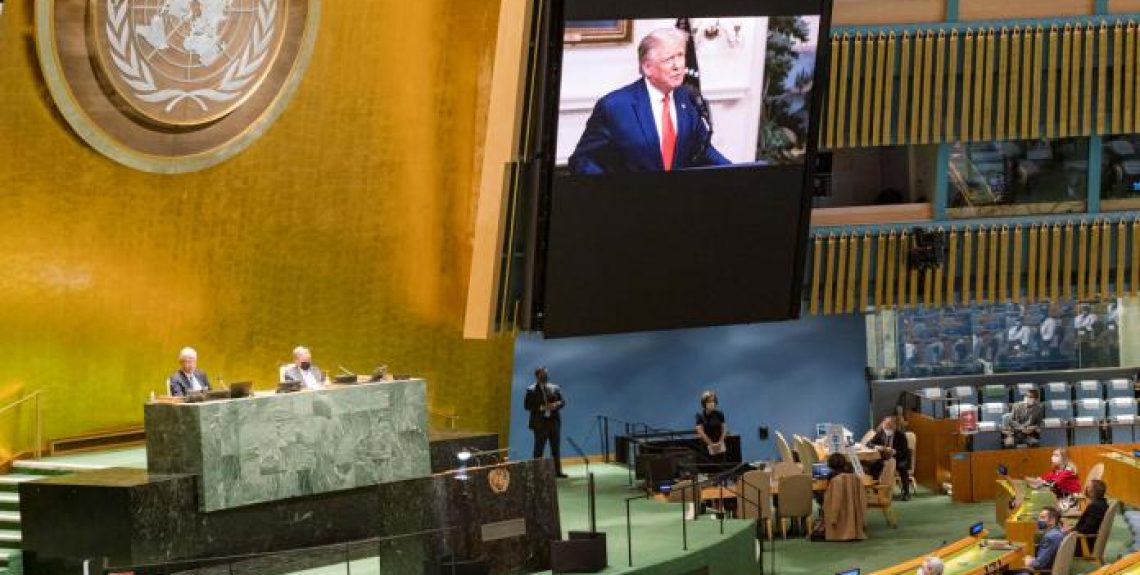The 2020 UN General Assembly and in particular its First Committee dedicated to disarmament and international security, that started its activities on the 5th of October, will become this year a battleground over sanctions against Iran. Sadly, the West will probably not stand as a common front.
On the 19th of September the US Secretary of State, Mike Pompeo announced the controversial US decision to initiate “the snapback process to restore virtually all previously terminated UN sanctions” and called all the UN members to do the same.
Just as the 2015 JCPOA deal, that ended a ten-year dispute with Iran, marked one of the highest moments of US/EU cooperation, the withdrawal from the deal by the Trump administration has become a major instance of transatlantic division. Beginning in 2003, France, Germany and the United Kingdom (the E3 countries) as well as the EU as a whole, engaged, together with the US as major players in a negotiation that lead to an epochal solution to the Iranian nuclear crisis. Aware of candidate Trump’s visceral hostility towards Iran, the EU Council, shortly after President Trump’s election reiterated “its resolute commitment to the JCPOA…. and the commitment to support its full and effective implementation, including by the lifting of nuclear related economic and financial sanctions”. In parallel the then EU High Representative for Foreign and Security Policy Federica Mogherini stated that the deal “is not a bilateral agreement between the US and Iran. It is a multilateral agreement that we have negotiated”.
Europeans soon discovered that their “resolute commitment” to lifting sanctions towards Iran would be impossible to implement because the US, in addition to re-introducing their sanctions against Iran, also decided to apply secondary sanctions against countries wishing to abide by their JCPOA commitments. The application of secondary sanctions on the part of the US even to its own allies, was a profound humiliation for Europe. Not only were Europeans prevented from respecting their commitments, they were forced to forfeit promising industrial and financial deals with Tehran.
European countries have attempted to circumvent these obstacles by creating an Instrument in Support of Trade Exchanges (INSTEX). To this day this financial mechanism has not been able to overcome the “maximum pressure” exerted by the Trump administration on Iran. However, in these past four years the Trump administration has not been able to replace the “worst deal ever negotiated” with an alternative negotiation. By blowing up the JCPOA it has paved the way for its Chinese and Russian competitors: Iran is now falling into their strategic orbit.
Europe has not managed to escape the American economic and financial diktat but has nevertheless maintained its core principle of keeping the JCPOA agreement alive in a multilateral framework despite the US withdrawal. In 2019, EU leaders boycotted the US sponsored conference held in Warsaw aiming at launching a more confrontational strategy towards Iran. They also refused to support the recent US initiative to extend the UN arms trade embargo against Iran due to expire shortly. Subsequently, the E3 have also maintained a consistent line against the more controversial US project of initiating the “snapback” mechanism that would reimpose all UN sanctions against Iran lifted in 2015. The E3 consider the US claim to use this mechanism established by the JCPOA unsustainable since the US is no longer a party to the deal. Though the language of the agreement lends itself to differing interpretations, it offends common sense that the United States, the number one non-complier to the JCPOA, accuse of non-compliance and invoke sanctions against the other parties unable to abide by the agreement precisely because of the US default.
The argument that the US cannot initiate the process of reinstating UN sanctions was recently reiterated by the High Representative of the Union, Josep Borrell, who coordinates the Joint Commission of the JCPOA. It is remarkable that, so far, the United Kingdom, despite Brexit, has sided with the EU on a stance that greatly irritates the United States.
Whether the UK and the EU will be able to resist US pressure to irreversibly cripple the JCPOA and make it a fait accompli even in case of a Democratic electoral victory, will be seen in the coming weeks.
Carlo Trezza
He was Italy’s ambassador for Disarmament in Geneva and chaired the Conference on Disarmament, the UN secretary general’s Advisory Board on Disarmament Affairs and the Missile Technology Control Regime.






















